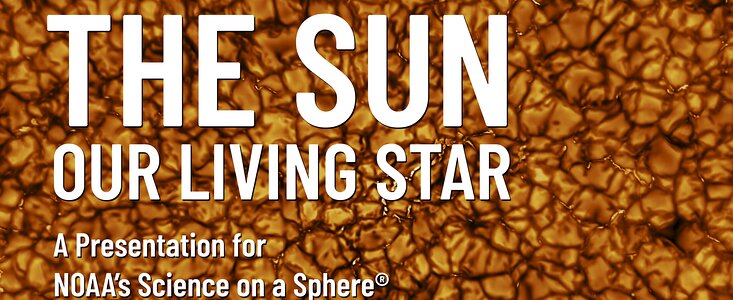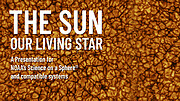The Sun: Our Living Star, Now Available for Free Download for Science On a Sphere
First Science On a Sphere show released by NSF NOIRLab for the Kitt Peak National Observatory
7 May 2024
What better way to visualize planetary and stellar data than projected on a giant, animated sphere? Science On a Sphere is an educational tool developed by the National Oceanic and Atmospheric Administration (NOAA) to help illustrate concepts of planetary science to people of all ages.
A Science On a Sphere system has been installed at the U.S. National Science Foundation Kitt Peak National Observatory, a program of NSF NOIRLab, and the first NOIRLab produced Science On a Sphere show is now available for free download to be used on any Science On a Sphere compatible system.
The Sun: Our Living Star explores the profound role of our Sun as a living entity that sustains life and energy on Earth. It delves into how the Sun influences our planet’s weather, ecosystems, and the changing seasons, while also delving into historical perspectives and key scientific revelations about our Solar System.
Featuring high-resolution images and videos projected on a sphere, the show sheds light on the Sun’s composition, its remarkable energy production through nuclear fusion, and the potential for harnessing solar energy as a sustainable power source. It concludes by contemplating the distant future when the Sun will expand, eventually engulfing inner planets, underscoring the enduring importance of the Sun as a life-giving force for our planet.
Through partly live solar and planetary data visualizations in The Sun: Our Living Star, students and other guests will gain insight to the Sun’s dynamic nature including its motions, cycles, and influence on space weather and on Earth. Guests will be able to recognize how breakthroughs in technology have significantly progressed our understanding of the Sun and led to the advancement of renewable energy solutions to address climate change.
The Sun: Our Living Star was designed for Science On a Sphere and compatible systems. The show script, as well as instructions for installing the show on an Science On a Sphere system, can be found here.
More information
NSF NOIRLab (U.S. National Science Foundation National Optical-Infrared Astronomy Research Laboratory), the U.S. center for ground-based optical-infrared astronomy, operates the International Gemini Observatory (a facility of NSF, NRC–Canada, ANID–Chile, MCTIC–Brazil, MINCyT–Argentina, and KASI–Republic of Korea), Kitt Peak National Observatory (KPNO), Cerro Tololo Inter-American Observatory (CTIO), the Community Science and Data Center (CSDC), and Vera C. Rubin Observatory (operated in cooperation with the Department of Energy’s SLAC National Accelerator Laboratory). It is managed by the Association of Universities for Research in Astronomy (AURA) under a cooperative agreement with NSF and is headquartered in Tucson, Arizona. The astronomical community is honored to have the opportunity to conduct astronomical research on I’oligam Du’ag (Kitt Peak) in Arizona, on Maunakea in Hawai‘i, and on Cerro Tololo and Cerro Pachón in Chile. We recognize and acknowledge the very significant cultural role and reverence that these sites have to the Tohono O’odham Nation, to the Native Hawaiian community, and to the local communities in Chile, respectively.
Links
Contacts
Ron Proctor
Motion Graphics Designer
NSF NOIRLab
Email: ronald.proctor@noirlab.edu
Josie Fenske
Jr. Public Information Officer
NSF NOIRLab
Email: josie.fenske@noirlab.edu







